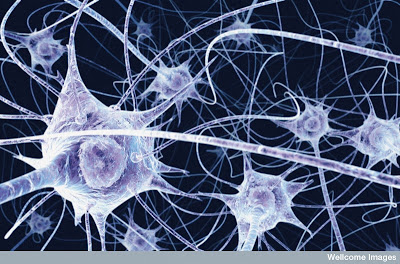Nerve Cells (Illustrated) Benedict Campbell/Wellcome Images Wellcome Images under the Creative Commons License
An East Indian friend once confided in me, “I have the mammary of an elephant.”I told him, “Please, no demonstrations.”
Which has nothing to do with the following...or does it?
A study shows reading the same material in an e-book does not have the same staying power as reading it in a hard format. Material read in a paper book is much easier to remember. There are several avenues of thought about why. The article describing the study is here: Are e-books bad for long term memory?
First, there are the locational cues given by a paper book. There's that valley in the middle of the book between the pages you've read and the pages you haven't read called the gutter. There is the thickness of the book on the left and right of the gutter that varies as the book is read. Page numbers, flaws in the paper, even the unconscious perception of the kerned spaces between letters trigger our brains to intensify the memory of that information or provide locational cues for its retrieval. Of course there's the obvious things like that mustard splotch at the bottom right corner of page 47 from eating a hot dog at one in the morning or the permanent indentations on pages 163 through 168 from using your Darth Vader action figure as a book mark. I think these may be a naturally occurring, unconscious, haphazard version of consciously visualizing different rooms in your mind to store information; a well-known memory trick.
Secondly, other studies show smaller screens showing less text are harder to remember than a larger expanse of reading material.
Thirdly, clicking back to find something is more distracting than flipping back physical pages.
How can e-book authors use this information? If you were formatting your own book (like as a pdf file) and selling it off your web site, there are many ways to take advantage of this knowledge. One could put a computer generated, randomly different frame around each page of text. There could be a scale on each side of the page representing how much of the book you’ve read and how much you have to go. As a note: Kindle has adopted a percentage-read device at the bottom of their page. The typical e-book author on Amazon or B&N, or anywhere else for that matter, pretty much has their hands tied as far as the visual presentation goes. They must leave it up to the publishing software programmers to add nifty memory enhancing stuff.
When you think about it, though, you really only need that stuff for textbooks, technical articles, and other non-fiction books. If you’re an e-book author writing fiction, however, the opposite approach could be taken. Make the presentation as nondescript as possible. Eliminate every spatial clue and make the number of words on the screen as few as possible. Hell, do away with the cover! After you've formatted your book in this manner, it is possible readers will forget they ever read your book and buy it again. Bwahahahaha!
Kidding. I think it would enhance fiction as well. If you incorporate every formatting idea discussed here, it's possible you could start running into people who quote from your book verbatim after reading it once. You could even be embarrassed by fans that know your book better than you.
“Remember when Bentoli asked Mumford ‘Just what do you know about the quantum entanglement frequency?’ and Mumford says ‘You’re about to call me ‘Kenneth,’ aren’t you?’ and...”
The scene ends with you running out of the restaurant with a gin and tonic still in your hand and into the cop that arrests you for trying to skate the tab and drinking unimaginatively in public.
It should give us pause to think how important presentation is to the human mind. It is more simple and more complex than we ever imagined. You would think that words on a screen are like words on paper, each conveying the same information. But words on paper have a secret life, backed up by clues for our unconscious mind as to order and retrievability. Mark my words (do not take a permanent marker and put curlicues around them), this information will soon be put to use by the likes of Amazon. Perhaps for the better, we would hope.
So back to my pachydermically endowed friend. Had I just laughed at the wonderfully naive play on words and gone on, would I have remembered it after several years? Or was it the additional memory cue of the retort not to show me?



No comments:
Post a Comment